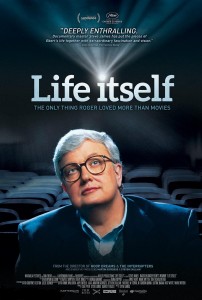Life Itself has the sympathetic appeal and gravitas of a rightfully great documentary about an unbreakable legacy. It’s the type of film Roger Ebert would’ve liked, even if it wasn’t chronicling the late film critic’s life and times.
Ebert’s “thumbs up/thumbs down” signature alongside buddying rival Gene Siskel left more than just an imprint on the film industry. Their clashing opinions and exuberance for winning movies had readers and viewers alike riveted. Life Itself shows us how their camaraderie and screen presence took shape through their years on TV. Documentarian Steve James interviews truthful yet loyal executive producers and family members who lived through the excitement and resentment that took place behind-the-scenes, and the doc does a splendid job at displaying how the love/hate relationship commemorated their teasingly competitive personalities.
The background documenting Siskel and Ebert at the Movies takes up a fair bit of Life Itself and it’s all entertaining and absorbing to watch. However, the doc is Ebert’s show and James is here to celebrate the expert’s passionate career in film criticism.
Life Itself, which also takes passages from Roger Ebert’s autobiography, starts with the foreboding present as we see Ebert – frail and sick – in the hospital. James has been invited to tape Ebert’s bed rest as well as procedures only nurses and his adoring wife Chaz witness. It gives viewers a new reality of Ebert’s post-surgery living conditions without milking anything. James and his doc are better than that.
James then time travels to Ebert’s days as a young buck who frequently found himself as a barfly, dialoging and debating with fellow friends and colleagues. He was a quickly maturing individual who took on multiple tasks and had no problem boasting a proud attitude. James handles Ebert’s lows such as alcoholism and depression as briefings and busily moves on to the brighter days.
The filmmaker isn’t trying to sidestep around his subject’s hamperings. He shows a fair share of how Ebert’s grandstanding often had people biting their lips. Just about each person interviewed in Life Itself can recall a time when the film critic gloated about his Pulitzer Prize to win arguments. I just think James realizes how much he has to fit in his doc, and how much more of a task the prioritizing is.
The moments that make our heart grow are the times when Life Itself shows movie goers how affective Ebert’s wisdom was towards the filmmakers and their films he was writing or talking about. Martin Scorsese serves up lots of interesting stories and articulated feelings about the significance of Ebert’s influential words (including acceptance towards Ebert’s distain for The Colour of Money), while various other filmmakers open up about how it meant for their indie to be taken under Ebert’s generous wings.
To a film lover and a critic who faithfully watched Ebert’s career inspire, Life Itself is a perfectly thoughtful and lovely achievement. The doc makes us laugh and feel in ways that help secure his placement in journalism history.
But, I watched Life Itself with my wife – who is a movie lover and knew of Roger Ebert’s importance – and her perceptions of Steve James’ film haven’t left my mind. They acted as a curious counter to how I took in the film. While she appreciated Life Itself, she found the documentary only invited in those who were super fans of Roger’s work. I’ll be incredibly interested to see how the modern general moviegoing public reacts to this documentary. Will they give it a thumbs up, or a thumbs down?



Leave a comment